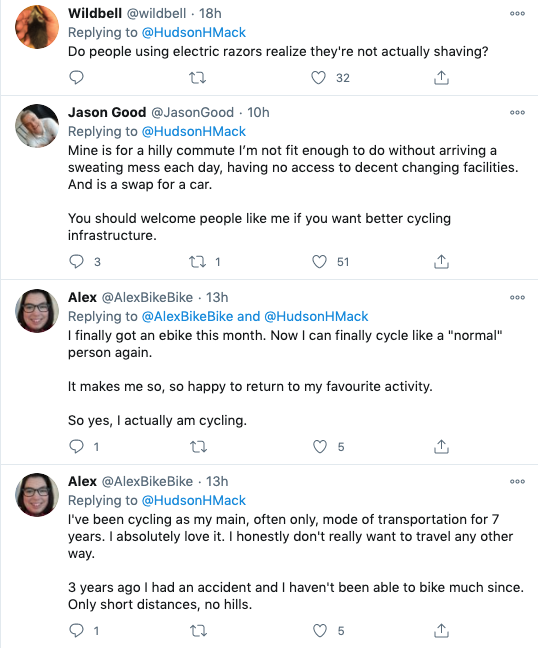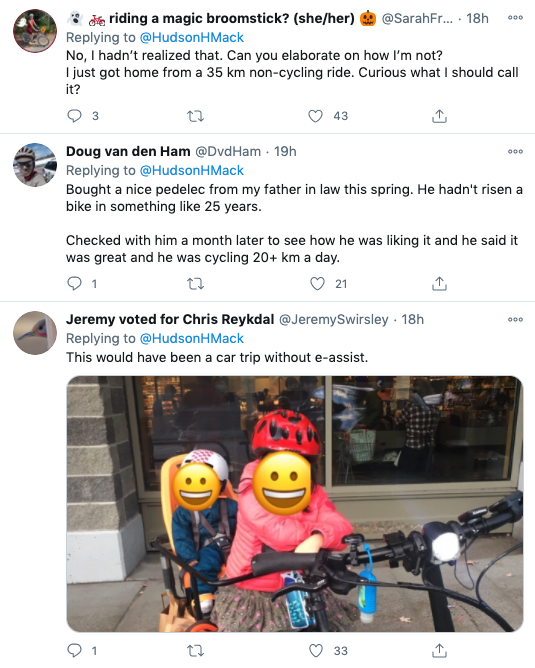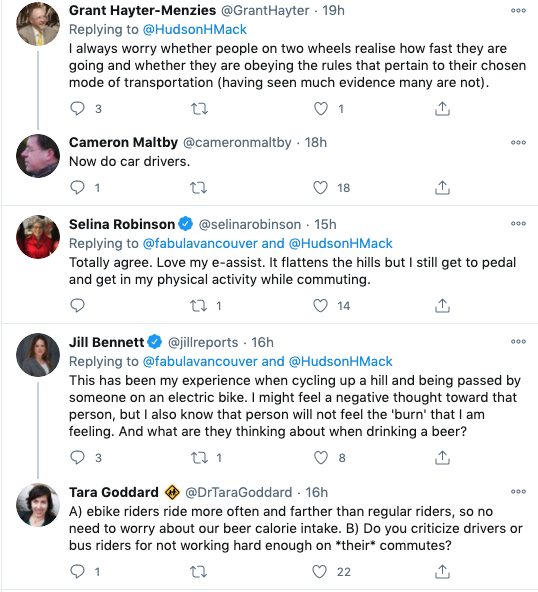Check Your Blind Spot — e-Bikes Really Could Change the World
Passion for transportation cycling has often inspired advocates to abandon all restraint, and admit their ultimate belief that bicycles can change the world.
It could be true, of course. But it’s not a belief often embraced by the mainstream of society, or at least by those choosing the other side of the argument.
It goes a little something like: “Maybe for you, but not for most”, “My kids need to get to soccer practice”, and “Not in the snow!”.
Every once in a while, however, new developments in the world of mobility challenge our collective assumptions of what’s not only possible, but what is actually happening on the ground. (No less so during COVID-19 — and perhaps moreso.)
And sometimes, all it takes is one moment, a set of interactions, to help us recognize that not only is the change happening, it’s already become mainstream reality…
No, not this tweet. It’s the reaction that followed. Here are some highlights:
Some might say we’re exacerbating the ‘dunking’ of former Vancouver Island TV news anchor Hudson Mack (who did indeed delete the tweet), but there’s reason to believe that providing a platform for the opposing viewpoints — which included a variety of everyday people extolling the virtues of e-bikes, including a newly re-elected MLA — has a greater benefit to society.
That’s because failing to acknowledge the positive (and sometimes hilarious) reactions would mean failing to demonstrate the widespread appeal of e-bikes. That this not-new technology had turned a corner, and was actually becoming the kind of mobility solution that can actually change the world.
But not if we fail to check our blind spots, and ignore the realities of what’s happening. And what’s happening is not how we choose to perceive reality in our own little bubbles, but what people are actually doing in the world. The reality Mack chose not to see around himself. And the reality that I too failed to see.
Wearing my advocacy hat, I too tried to express some ‘hot takes’ about e-bikes recently, and in the process failed to check my blind spot to see what was actually happening.
Not election policy debates, but real people in the real world.
It was early October, in the midst of the provincial general election, and I was asked to appear on CBC Early Edition with host Stephen Quinn to address the ‘e-bike controversy’.
The controversy, by the way, only really existed Twitter in British Columbia. (And even then…)
The topic was e-bikes because of this statement from Andrew Wilkinson, in response to a question Quinn himself asked the now-former BC Liberal leader about his party’s promises regarding new exemptions to the 7% provincial sales tax:
Bicycle store owners tell us that people are getting away from cars because they can't afford them. And buying electric bikes to conduct their daily lives. They're grocery shopping with them, they're taking their kids to school with them.
And this is what we can do in a city like Vancouver, is provide people with better ways to get around that are more affordable.
And taking the sales tax off electric bikes and many other things is a very, very important step to make life more affordable for people, especially at the low income level.
So of course, because it was an election campaign, the BC NDP weighed in:
Oy gevalt. Yes, a bad campaign take, which itself generated an absolute wave of push-back from Twitter.
So, on I went to the 6:10am radio spot.
Stephen Quinn: Is the 7% PST actually preventing people from buying e-bikes?
Colin Stein: You know, it's difficult to say whether many people would decide to buy an e-bike simply because they get the tax break, or conversely to not buy an e-bike because of the lack of a tax break.
We think that financial incentives, this entire debate, is missing the real point, which are the legislative and the regulatory gaps.
SQ: When Gordon Price was a city councillor, I remember him warning everybody that small electric vehicles were coming, and that we better have regulations in place when they do. And of course, we still don't.
CS: We don't. And there's nothing wrong with the hover-boards, the longboards with the motor on them, and of course you've got a whole wide variety.
But there are vehicles that have greater speeds than allowed by the motor vehicle act, 32 kilometres per hour. They exceed the common weights that you would find for a bike even with a battery on it, and they go really fast.
They're also game-changers, we just need to define them and allow them to be sold, because technically these can't even be used in the province. But they are. People are buying them and using them. It's changing the way we move around.
So let's get the regulations and everything else up to speed so we know what we can use.
SQ: So if e-bikes are going to be tax exempt, should those other electric forms of transportation, whether it be scooters or hover-boards or those single wheels, should they be tax exempt as well?
CS: In theory yeah, I mean — financial incentives, well of course that's great, make everything outside of motor vehicles usage a little bit cheaper.
But again, let's focus on the regulations, let's get people able to insure them, let's get people feeling like when they buy something, they know that it's allowed on the roads, and they're not basically at risk to themselves, to someone else. Or being pulled over and ticketed for something that they felt like they bought legitimately.
What was my blind spot here?
It was the reality experienced by so many British Columbians — that affordable, efficient, safe and healthy transportation options, like e-bikes, are highly valued and sought after.
And that, for some people, an extra thousand bucks in their pocket can make a big difference in their decision to get rid of an internal combustion engine for their personal mobility.
Perhaps my answer was smart, in the ways in which so much talk about laws and regulations and the problems of government bureaucracy can often sounds smart.
But it wasn’t the question and, like Mack’s tweet, it failed to recognize that more people cycling —which can be achieved through both positive cultural reinforcement and financial incentives — is where we need to focus.
As politicians. As advocates. And as people.
Despite the real-world implications of our outdated laws and regulations, it’s not what’s keeps most people up at night.
It’s the daily grind. Getting around and paying the bills.
It’s what was expressed so eloquently by Alexandra recently, in an email to our friends at the Greater Victoria Cycling Coalition.
And it’s not unlike the story Andrew Wilkinson was trying to relate on CBC in the first place.
Hi! I'm Alexandra. My 2-year-old son and I live in an apartment on Gorge Road. Half of my income goes towards rent, so I don't have enough money for a car, gas or insurance.
I'd love to own an electric cargo bike that I could use to do all those things I need to do: travel to work, run errands, get groceries. But most e-bikes and cargo e-bikes cost anywhere from $3,000-$10,000, or more. With limited income and savings there's no way I can afford that.
Government support to purchase bikes and e-bikes is virtually non-existent ($1,000 if you scrap a car), but they will give you up to $8,000 to buy a new electric vehicle. $0 for a new e-bike, $8,000 for a new EV.
How about some equity? Driving is expensive. Car purchase, gas, insurance and maintenance/repairs adds up to tens of thousands of dollars.
E-bikes are cheaper, healthier and way better for the environment. They're not a luxury vehicle, they're an essential mode of transportation for families living in very expensive cities.
I'm calling on all political parties to create a Grants for Bikes program, and do more to help people get on bikes!
So yes, we could use a little financial relief for e-bikes. Grants for Bikes? Sure! That’s the debate we should still be having.
And the next time you see someone go past you on an e-bike, just remember that’s one more person who’s not in a car. It’s someone cycling.
It can change the world, if we want it.








